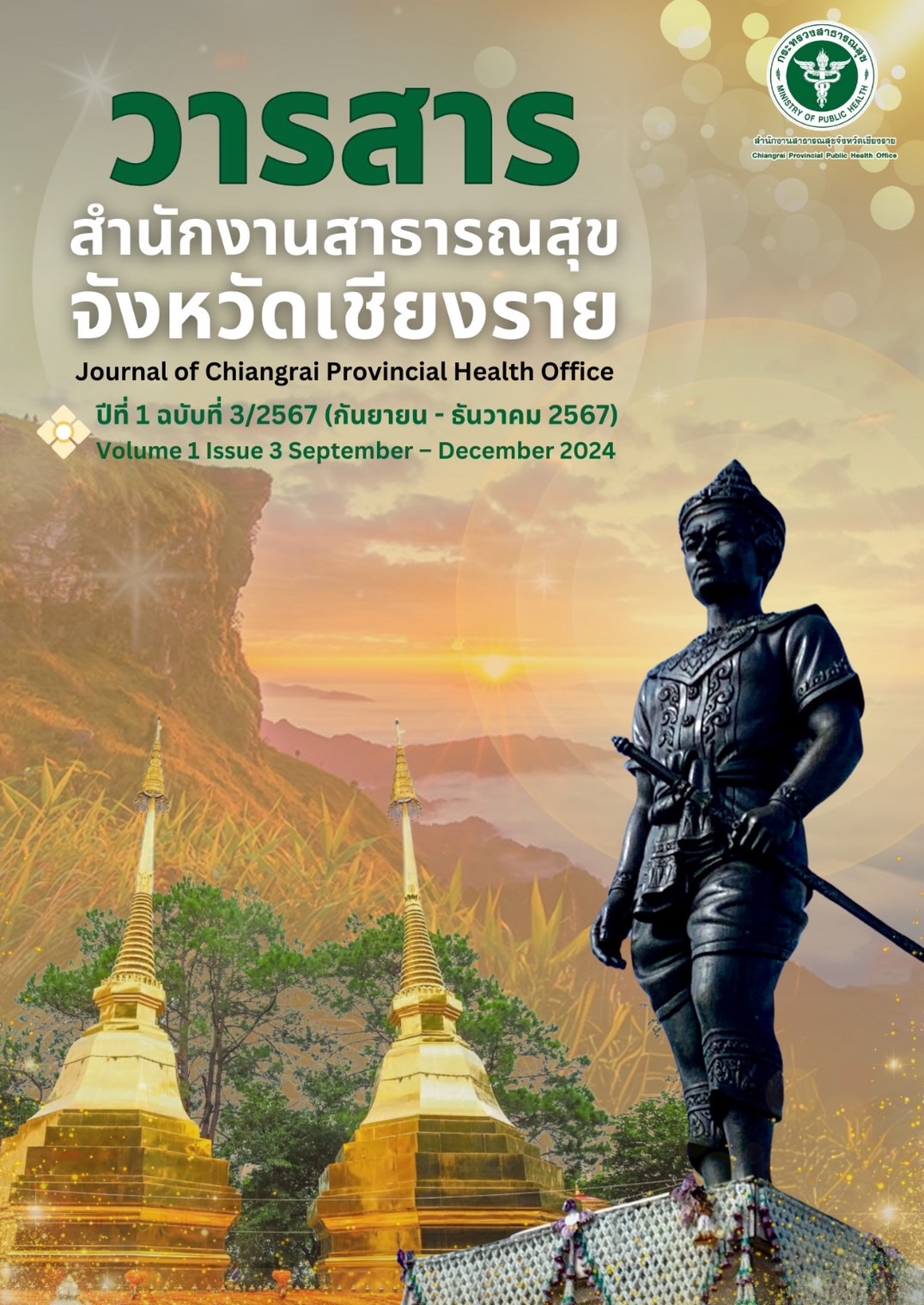The Effect of self-management program on pulmonary function in Chronic Obstructive Pulmonary Disease, Wiang Kaen Hospital, Chiang Rai Province
Abstract
Chronic obstructive pulmonary disease (COPD) is a condition that leads to decreased pulmonary function in affected patients. This study employed a quasi-experimental design with two groups and pre- and post-intervention measurements. The objective was to examine the effects of a self-management program on pulmonary function in patients with COPD.
Data was collected at Wiang Kaen Hospital, Chiang Rai Province, from January to March 2024. The sample consisted of 70 patients diagnosed with COPD, divided into an experimental group (35 patients) and a control group (35 patients) using simple random sampling. The control group received standard care, while the experimental group participated in an eight-week self-management program. Data collection utilized a pulmonary function record form, a modified Medical Research Council dyspnea score, and a COPD self-management behavior scale. The self-management behavior scale had a content validity index (CVI) of 0.9 and a Cronbach’s alpha reliability coefficient of 0.83.
The study found that after participating in the program, the experimental group had a significantly lower mean dyspnea severity scores than before the intervention and the control group (p<0.001, p<0.001, respectively). The mean distance in the six-minute walk test, and the mean self-management behavior scores were significantly higher than before the intervention and the control group (p=0.014, p<0.001, respectively). The mean forced expiratory volume in one second (FEV1) was significantly higher than before the intervention (p<0.001). However, it was not significantly different from that of the control group. These findings indicate that the self-management program effectively improves pulmonary function and self-care behaviors in COPD patients and should be considered for continuous implementation.
References
Boers E, Barrett M, Su JG, et al. Global burden of chronic obstructive pulmonary disease through 2050. JAMA Network Open. 2023 Dec 1;6(12):e2346598.
สำนักนโยบายและยุทธศาสตร์ กระทรวงสาธารณสุข. สถิติโรคกรมการแพทย์. รายงานสถิติโรค ปีงบประมาณ 2564. กรุงเทพมหานคร: สำนักนโยบายและยุทธศาสตร์กระทรวง; 2564.
หน่วยงานเวชระเบียน. รายงานสถิติผู้ป่วยนอกและผู้ป่วยใน ปี 2564 - 2566. เชียงราย: งานเวชระเบียน โรงพยาบาลเวียงแก่น; 2566.
สมาคมอุรเวชช์แห่งประเทศไทย ในพระบรมราชูปถัมภ์. แนวทางการวินิจฉัยและรักษาโรคปอดอุดกั้นเรื้อรัง พ.ศ. 2565. กรุงเทพฯ: ภาพพิมพ์; 2565.
Krompa A, Marino P. Diagnosis and management of pulmonary hypertension related to chronic respiratory disease. Breathe. 2022 Dec 1;18(4).
Csoma B, Vulpi MR, Dragonieri S, et al. Hypercapnia in COPD: causes, consequences, and therapy. J. Chronic Obstr. Pulm. Dis. 2022 Jun 2;11(11): 3180.
Neder JA, de Torres JP, O’Donnell DE. Recent advances in the physiological assessment of dyspneic patients with mild COPD. COPD: Journal of Chronic Obstructive Pulmonary Disease. 2021 Jul 1;18(3): 374-84.
Pham Thi Thanh Phuong, วิมลรัตน์ ภู่วราวุฒิพานิช, วัลย์ลดา ฉันท์เรืองวณิชย์. ความสัมพันธ์ระหว่างสมรรรถนะแห่งตน ภาวะซึมเศร้า ความวิตกกังวล และคุณภาพชีวิตในผู้ป่วยโรคปอดอุดกั้นเรื้อรัง. J Nurs Sci. 2017;35 Suppl 1:47-55.
Hurst JR, Skolnik N, Hansen GJ, et al. Understanding the impact of chronic obstructive pulmonary disease exacerbations on patient health and quality of life. Eur. J. Intern. Med. 2020 Mar 1;73:1-6.
หนูกาญจน์ แฝงเมืองคุก, อิน วงษ์เคน, คณรัตน์ เคโฟเซซ์. การพัฒนาแนวทางปฏิบัติการบริการพยาบาลส่งเสริมการจัดการตนเองของผู้ป่วยโรคปอดอุดกั้นเรื้อรังรายใหม่ คลินิกโรคปอดอุดกั้นเรื้อรัง โรงพยาบาลน้ำโสม. วารสารอนามัยสิ่งแวดล้อมและสุขภาพชุมชน. 2567;9(2):98-108.
ปัทมาพร ชนะมาร. การพัฒนาโปรแกรมการจัดการตนเองของผูสูงอายุโรคปอดอุดกั้นเรื้อรัง จังหวัดมหาสารคาม. วารสารวิจัยการพยาบาลและสุขภาพ. 2561;19(1):61-72.
อุมาภรณ์ สอนปัญญา, พรอนันต์ โดมทอง, วรรณา ปิยะเศวตกุลม, พิเชษฐ เรืองสุขสุด, อนุชา ไทยวงษ์. ผลของโปรแกรมการจัดการตนเองต่อค่าสมรรถภาพปอดของผู้ป่วยโรคปอดอุดกั้นเรื้อรัง โรงพยาบาลขอนแก่น. วารสารวิชาการทางการพยาบาลและวิทยาศาสตร์สุขภาพ. 2566;3(2):114-126.
Creer, TL. . Self-management of chronic illness. In Handbook of self-regulation. Academic Press; 2000.
ธาดา วินทะไชย, นรลักขณ์ เอื้อกิจ. ผลของโปรแกรมการจัดการตนเองต่อสมรรถภาพปอดของผู้ป่วยโรคปอดอุดกั้นเรื้อรัง. วารสารพยาบาลศาสตร์ จุฬาลงกรณ์มหาวิทยาลัย. 2561;30(2):124-135.
กมลทิพย์ ช้างทอง, รังสิยา นารินทร์, ศิวพร อึ้งวัฒนา. ผลของโปรแกรมส่งเสริมการเรียนรู้ต่อความรู้และการปฏิบัติการดูแลสุขภาพปอดในกลุ่มเสี่ยงต่อโรคปอดอุดกั้นเรื้อรัง. วารสารมหาวิทยาลัยคริสเตียน. 2566;29(2):28-44.
Li Y, Ji Z, Wang Y, Li X, Xie Y. Breathing exercises in the treatment of COPD: an overview of systematic reviews. Int J Chron Obstruct Pulmon Dis. 2022;17:3075-85.
Luley MC, Loleit T, Knopf E, Djukic M, Criée CP, Nau R. Training improves the handling of inhaler devices and reduces the severity of symptoms in geriatric patients suffering from chronic-obstructive pulmonary disease. BMC geriatrics. 2020 Dec;20:1-8.
Downloads
Published
How to Cite
Issue
Section
License
Copyright (c) 2024 Chiang Rai Provincial Health Office

This work is licensed under a Creative Commons Attribution-NonCommercial-NoDerivatives 4.0 International License.
บทความที่ได้รับการตีพิมพ์เป็นลิขสิทธิ์ของสำนักงานสาธารณสุขจังหวัดเชียงราย
ข้อความที่ปรากฏในบทความแต่ละเรื่องในวารสารวิชาการเล่มนี้เป็นความคิดเห็นส่วนตัวของผู้เขียนแต่ละท่านไม่เกี่ยวข้องกับสำนักงานสาธารณสุขจังหวัดเชียงราย และบุคลากรท่านอื่น ในสำนักงานสาธารณสุขจังหวัดเชียงราย แต่อย่างใด ความรับผิดชอบองค์ประกอบทั้งหมดของบทความแต่ละเรื่องเป็นของผู้เขียนแต่ละท่าน หากมีความผิดพลาดใด ๆ ผู้เขียนแต่ละท่านจะรับผิดชอบบทความของตนเองแต่ผู้เดียว



